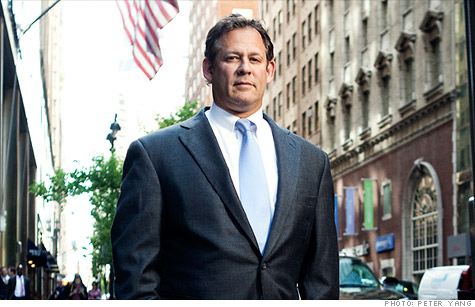Search News

Rieder outside BlackRock?s headquarters in Midtown Manhattan. He previously spent 20 years at Lehman Brothers.
FORTUNE -- Rick Rieder is not the best-known man in bonds. That honor belongs to Pimco's Bill Gross, manager of Total Return, the world's largest bond fund. But Rieder, 49, is a titan in his own right. As the chief investment officer of fundamental fixed-income portfolios at BlackRock, the world's largest asset-management firm, he oversees $595 billion in investments. Before joining BlackRock (BLK, Fortune 500) in 2009, Rieder spent 20 years at Lehman Brothers; was CEO of the $1.5 billion credit fund R3, which he and his partners bought out of Lehman after the bank melted down; and was vice chairman of the Treasury Department's borrowing committee. Recently Rieder has grabbed attention for his bullish outlook on Treasuries. That position puts him squarely opposite his more famous counterpart Gross, who's been dumping Treasuries ahead of the end of the Federal Reserve's quantitative easing program, or QE2. Fortune caught up with Rieder to talk about why he thinks Treasury yields will stay stable after the Federal Reserve stops buying U.S. debt and why corporations are healthier than the overall economy.
Why will there not be a sell off in Treasuries when QE2 ends?
Think about it this way. With QE2, the Fed isn't just buying Treasuries; the Fed is creating an incredible recycling of global reserves that goes into every financial asset class. With so many currencies pegged to the dollar, we functionally exported this monetary policy throughout the world and created extraordinary growth in global liquidity. From Sept. 1 until now, there has been about $10.5 billion a day worth of liquidity coming into the global markets -- a staggering amount.
So what does it mean for QE2 to go away? When liquidity goes away, you often see more volatility. And that usually creates demand for stable investments like Treasuries. So I don't think we'll see the sell off that some people predict, and prices and yields should stay in a stable range.
Are you worried about the dollar's recent decline in value?
So far I'm not worried. The current drop is part of the Fed's view that a gradual decline isn't bad for the economy. It should help support exports and manufacturing, which leads to job creation. If it fell very far very fast, that would be a different matter.
What's your strategy now?
We're looking for assets that offer yield without taking on too much duration risk. We like the intermediate part of the Treasury curve and have been buying on the dips. We also like high-yielding assets that don't have a tremendous amount of duration, like high-yield debt loans, investment-grade commercial mortgages, and investment-grade credit.
I've been doing this for 25 years and I've never seen the corporate sector in such profoundly good shape, even with the economy arguably struggling. I truly don't think you can have a default in an investment-grade company today because they've converted most of their short-term debt to long-term debt, they have tremendous free cash flow, and they can monetize assets. In a recent presentation, I argued that a single-A company today is akin to what you would normally describe as a triple-A.
Is there similar support for corporate junk bonds?
High yield is obviously riskier, but these companies can still refinance their debt and have pretty good free cash flow. Default rates are going to stay extremely low for a long time.
Are you avoiding long-dated bonds out of concern about inflation?
I think we'll see core inflation rise half a percentage point or so, and the Treasury market has built in a reasonable inflation expectation. So we're buying floating-rate assets, like loans.
What do you think of the job the Fed has done?
I think that QE2 was the right policy, and that letting it expire is the right policy. I wouldn't agree with QE3. I would say broadly that the Fed has done a very good job of navigating the waters. Now the big job is to create policy to deal with the country's deficits. Deficits have a practical effect on investors. For example, equity valuations are dramatically higher when we're in periods of surplus.
The U.S. economy is the most indebted it's ever been. Government at state, local, and federal levels is highly levered. That means there's not a lot of flexibility to borrow, and in the past 30 years borrowing has functionally been rocket fuel for economic growth.
With rates where they are today, the cost to pay the interest on our loans does not put the U.S. economy in grave danger. But if policymakers lost control of where rates are, interest payments would be a tremendous burden on the economy.
A number of people say we need to bring the debt down in this country, but I don't think we can actually do that by any significant magnitude. You can't grow an economy without borrowing. What we have to do is bring down the leverage, meaning that we can't let debt grow as quickly as GDP grows. ![]()

Carlos Rodriguez is trying to rid himself of $15,000 in credit card debt, while paying his mortgage and saving for his son's college education.
| Overnight Avg Rate | Latest | Change | Last Week |
|---|---|---|---|
| 30 yr fixed | 3.80% | 3.88% | |
| 15 yr fixed | 3.20% | 3.23% | |
| 5/1 ARM | 3.84% | 3.88% | |
| 30 yr refi | 3.82% | 3.93% | |
| 15 yr refi | 3.20% | 3.23% |
Today's featured rates: